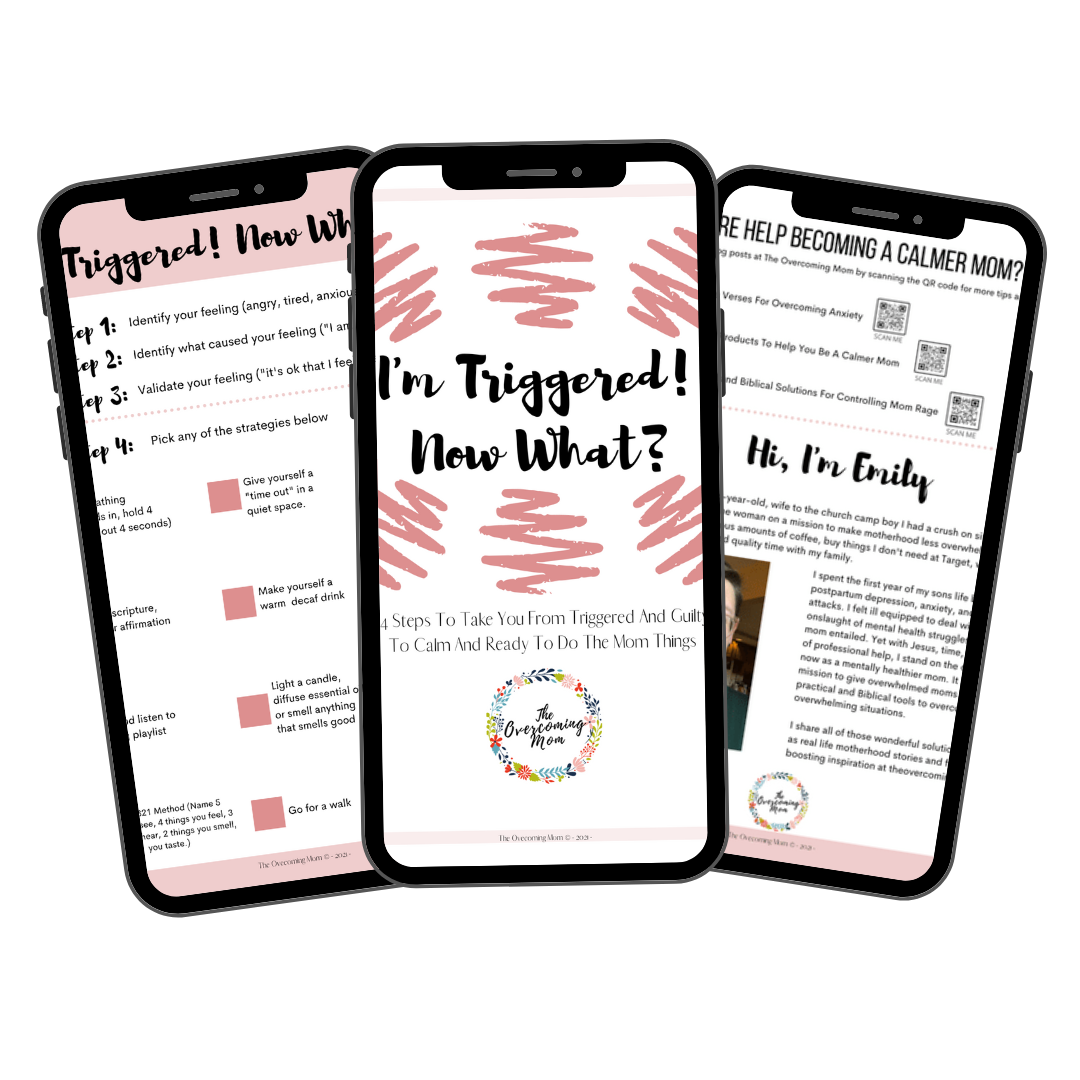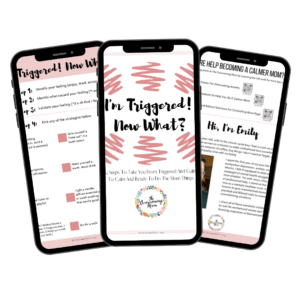This page may contain affiliate links. As an Amazon Associate I earn from qualifying purchases. If you want more information, please see my Affiliate Disclosure.

Often in our society, mental health struggles tend to be stigmatized and presented in sort of a characterized way that isn’t very accurate. For example, for those of us who struggle with anxiety, we often see anxiety being portrayed in the media as the crazed looking person rocking back and forth in a corner somewhere. The real truth is that anxiety can look much more subtle than that. Some of us really do have moments when we rock back and forth in a corner (or at least feel like it), but the majority of those struggling with anxiety blend right in with typical society. They participate in life, just like everyone else, not looking like anything is wrong, yet may be dealing with racing thoughts, mental exhaustion, chronic fatigue, and barely making it through daily life. People with this “invisible” kind of anxiety are often referred to as having High Functioning Anxiety (also known as HFA).
Though high functioning anxiety isn’t an official diagnosis according to the Diagnostic and Statistical Manual of Mental Disorders (also known as the DSM-5), which is the diagnostic tool used by therapists and mental health professionals, the term does a good job explaining what this type of anxiety looks like. It is a form of anxiety that hides behind the facade of a well-functioning individual who looks like they’re fine on the outside, but having a hard time coping with internalized high standards, persistent nervous energy, obsessive thoughts, and a myriad of other struggles.
In this article, we’re going to break down what exactly high functioning anxiety is, as well as revealing warning signs that high functioning anxiety may be having a negative impact on your life. As someone who personally has struggled with anxiety, I know what the internal struggles of living with anxiety is like. It is my hope that revealing these warning signs will help you be aware, and hopefully work towards a road to recovery.
What Is High Functioning Anxiety?
High Functioning Anxiety (HFA) is a type of anxiety that manifests itself as an ongoing, intense, and pervasive form of worry, fear, and stress about everyday activities. It often masks itself as overly-ambitious or hard-working behavior, but can lead to physical and psychological distress if left unchecked; it can cause exhaustion, irritability, and difficulty concentrating, as well as impairing your ability to perform everyday tasks.
Some common symptoms of high-functioning anxiety include:
- Feelings of dread or fear that seem to come out of nowhere
- Worrying and ruminating about future events or situations
- Emotional exhaustion and feeling overwhelmed
- Trouble concentrating and focusing
- Difficulty making decisions
- Social discomfort or awkwardness in conversations
- Physical sensations like heart racing, nausea, trembling, sweating, headache
- Perfectionism coupled with an inability to find satisfaction in accomplishments
The causes of high-functioning anxiety are from many different factors. It may be triggered by an underlying mental health condition, such as depression, generalized anxiety disorder, social anxiety disorder, panic disorder, or obsessive-compulsive disorder, or it could arise from life stressors like financial difficulties or relationship issues. It can also be the result of having a poor work-life balance, leading to feelings of overwhelm and panic. People with high functioning anxiety often feel driven to succeed but find themselves constantly struggling against their own inner doubts and fears.
High functioning anxiety can also have an impact on physical health. Sufferers often experience:
- shallow breathing,
- chest tightness,
- tension headaches,
- jaw pain
- increased heart rate.
- trouble sleeping
Over extended periods of time, this can detrimentally affect the immune system and increase the risk for developing conditions such as IBS or chronic pain. Research suggests that those who suffer from anxiety disorders are more likely to struggle with sleep disorders due to their inability to relax and let go of stressful thoughts. Furthermore, an increased risk of substance abuse has been linked to those who cope with their troubles through alcohol or drug use rather than addressing the root cause of their mental distress.
To sum it up, living with high functioning anxiety makes a person look as if they are fine on the outside, but in reality they are anxious people whose nervous system are is working in overdrive all day long to compensate for their persistent worry over what some might find minor.
This sneaky version of anxiety isn’t something we should ignore, but instead confront, accept, and treat. So what are the signs of high functioning anxiety we need to look out for?


You’re Feeling Overwhelmed Constantly
Many types of anxiety can cause a person to feel overwhelmed and unable to cope with everyday life, but those struggling with high functioning anxiety may fly under the radar easier. It can manifest itself as an ongoing, intense, and pervasive form of worry, fear, and stress that often masks itself as overly-ambitious or hard-working behavior. It can lead to physical exhaustion due to the constant sense of dread and apprehension that it causes in those who suffer from it. Additionally, it may also lead to emotional distress such as irritability or difficulty concentrating on tasks at hand. All these factors contribute towards a feeling of being overwhelmed by day-to-day activities which makes functioning normally difficult if not impossible for someone suffering from high functioning anxiety.
Often people with anxiety don’t show others how overwhelmed they really are. They may look like a person with tons of hard working positive traits, but in reality they’re overwhelmed and hiding it well. High functioning anxiety can also make it seem that a person is welcoming, or even enjoying, all of the obligations in their life, but in reality they feel like they’re drowning. Instead of setting boundaries or saying “no” to obligations that can wait, they push though, often at the cost of their mental health.
You’re Losing Sleep Because Of Anxious Or Overthinking Thought Patterns
When people are dealing with high functioning anxiety, it can be difficult to get a good night’s sleep. Anxiety causes excessive worrying and rumination, which can keep your mind racing and prevent you from resting peacefully. If you’re losing sleep because of anxious thoughts, this is a sign that high functioning anxiety is taking a toll on your life.
It’s no surprise that lack of sleep can have a profound affect on your entire body, but lack of sleep can also make feelings of anxiety much worse. It’s also no surprise that a lack of sleep can have a profound affect on a person’s health. Putting an end to the sleep deprivation, though easier said than done, can greatly benefit those with anxiety in the long run.
During my bout of postpartum insomnia, I found the Insomnia Coach app and it helped me tremendously with developing better sleep hygiene. You can check it out for free right here!
You’re Overbooking Yourself
People with high functioning anxiety tend to overbook their schedules because of a fear of letting people down or missing out. This is a common symptom of HFA, as these individuals often feel overwhelmed and stressed by the prospect of not doing enough. As a result, they may take on more tasks than they can handle in an attempt to please everyone and avoid feeling like they are falling behind. Overbooking themselves leaves them exhausted and unable to focus on any one task, leading to further feelings of anxiousness and distress.
A person with high functioning anxiety can often look like a go-getter type who wants to do it all, but in reality they’re scared of disappointing others to the point that they put their needs behind others. Learning how to set boundaries around your schedule and say “no” to obligations you don’t have the time or energy for is a great step at alleviating the overwhelm associated with overbooking yourself.
You’re Experiencing Decision Fatigue, Or Indecisiveness Regularly
Decision fatigue is a term that describes the mental drain that can occur when making too many decisions in a short amount of time. People who regularly struggle with anxiety often feel the need to solve every problem they think up immediately. When we are left with decision after decision, at some point it becomes mentally draining to decide every decision.
Mothers can be particularly prone to decision fatigue due to the sheer number of decisions they have to make on a daily basis. From meal planning and grocery shopping, to scheduling playdates and doctor’s appointments, mothers are constantly making decisions that affect not only their own lives but those of their children as well. This constant barrage of decisions can lead to an overwhelming feeling of exhaustion and indecisiveness. As such, it is important for mothers to take time out in order to recharge and reflect on their choices in order to avoid becoming overwhelmed by decision fatigue.
While some people struggle with making too many decisions, resulting in decision fatigue, some of us struggle with the opposite problem: indecisiveness. We have difficulty figuring out what we want, and our lack of a clear vision holds us back from making progress. To help break free from indecisiveness, it can be helpful to take some time to figure out your core values. Consider the things that matter to you most in life – kindness, justice, creativity, courage – and determine which values are non-negotiable. When you have a set of core values, any decisions that arise can be evaluated based on how they align with those values.
If decision fatigue or indecisiveness is something that is bringing you lots of distress, finding ways of delegating tasks to your spouse or another family member can be a good place to start. It may also help organizing your decisions into “to decide on now” and “to decide on later” piles. That way you’re not wasting precious mental energy on decisions that aren’t pertinent yet.
You’re Regularly “Masking” Your Anxiety
Masking anxiety can look like a person trying to appear confident and composed on the outside, while they are struggling with intense inner turmoil and distress. People with high functioning anxiety tend to put on a brave face in order to cope with their situation, often pretending that everything is fine when it really isn’t. Masking anxiety can be a temporary solution; however it can lead to long-term problems like exhaustion and detachment from the people and activities you care about.
Hiding your true feelings behind a facade is never a god way to manage any mental health issues. If anything, masking only makes high levels of anxiety even higher!
If you think you’re making a habit of masking your anxiety, I recommend finding a safe person or other outlet to practice “unmasking” in front of. You could start with journaling. Start with writing down your anxieties and using paper and pen to vent those feelings. If you’re comfortable, finding a safe person or professional to “unmask” the anxiety with too will be incredibly beneficial for dealing with anxiety.
What Should You Do If You Believe That High Functioning Anxiety Is Ruining Your Life
It can be difficult to recognize the signs of high functioning anxiety and acknowledge that it is having a negative impact on your life. However, once you have identified it as the source of your struggles, there are steps you can take to help manage it and get back on track.
The first step is to practice self-care. Taking care of yourself physically and mentally can provide much needed relief from stressors such as work or school pressures, social obligations, or family responsibilities. This means setting aside time each day for activities like exercise, reading a book, listening to music, or spending time with friends or family members who make you feel supported and loved. Additionally, getting plenty of sleep and eating nutritious meals will help keep your energy levels up so that you’re able to face any challenges head-on without becoming overwhelmed by them.
It is also important to create healthy boundaries in order to protect yourself from taking on too many tasks at once which may lead to feelings of anxiousness or exhaustion. Prioritizing what needs to be done first will allow you more control over how much time and energy is being devoted towards each task rather than spreading yourself thin trying do everything all at once.
Lastly but most importantly finding ways reduce stress such as taking time to meditate or practice mindfulness will help you gain a sense of control and clarity over the decisions that need to be made.
Managing high functioning anxiety can be a challenge, especially if you are unsure of how to cope with the intense feelings of distress and uncertainty it brings. Seeing a therapist, counselor, or mental health professional is an effective way to learn techniques for dealing with these emotions in a healthy and constructive manner. A therapist can provide valuable insight into your individual situation and offer personalized guidance on how best to manage your high functioning anxiety. They will help identify triggers that may lead to anxiousness or panic attacks and work collaboratively with you to create strategies for coping when such situations arise. Additionally, they can offer support during times of stress as well as provide resources such as relaxation exercises or mindfulness practices which have been scientifically proven to reduce symptoms associated with HFA. Ultimately, seeing a therapist is an invaluable step towards taking control over one’s mental health and learning how best manage their high functioning anxiety.
Taking Charge Of High Functioning Anxiety
High functioning anxiety is a difficult condition to live with and it can be overwhelming, especially if you don’t know how to manage it. However, by taking the time for self-care, creating healthy boundaries, prioritizing tasks and seeking professional help from a therapist or counselor when needed are all effective ways of managing your high functioning anxiety. With dedication and perseverance these strategies can provide relief from feelings of stress and uncertainty as well as offer insight on how best to cope in situations that may lead to anxiousness or panic attacks. Taking charge of one’s mental health is essential in order to prevent HFA from having an adverse impact on their lives; so make sure you take the necessary steps towards achieving this goal today!
Mental Health Resources
- National Institute of Mental Health – is the lead federal agency for research on mental health conditions. They offer lots of information and statistics on various mental illnesses, and they have a database of healthcare providers. They also have a suicide hotline and crisis hotline (Call 988 For the suicide and crisis hotline) , as well as free crisis text line (Simply text HELP to 741741.)
- Anxiety And Depression Association of America – has a wonderful site that provides lots of information about anxiety and depression, as well as various tools for receiving help.
- Betterhelp – Is an online therapy service that makes therapy accessible and affordable for all people. They have a huge database of therapist with many specialties, and offer many ways to participate in therapy. From online counseling, to over the phone sessions, they odder a plethora of ways you can get help from a therapist.
- Faithful Counseling – Is very similar to Betterhelp, but is a database of online Christian therapists. If you would prefer to receive therapy from a faith-based perspective, then this could be just for you.
- Brightside – offers online medication and therapy treatments for depression and anxiety. You can get an appointment with an online provider in as little as 48 hours, and each treatment plan is catered to your personal needs.










